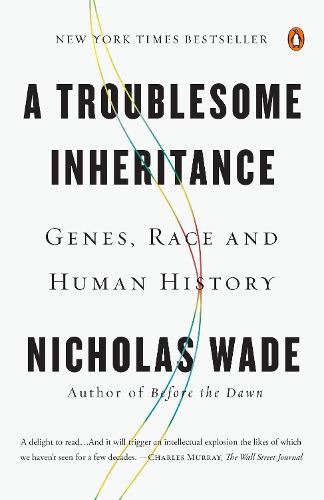
A Troublesome Inheritance: Genes, Race and Human History
(Paperback)
Publishing Details
A Troublesome Inheritance: Genes, Race and Human History
By (Author) Nicholas Wade
Penguin Putnam Inc
Penguin USA
24th June 2015
14th May 2015
United States
Classifications
General
Non Fiction
Human biology
Evolution / Evolutionary biology
599.938
Physical Properties
Paperback
288
Width 140mm, Height 214mm
264g
Description
A Troublesome Inheritance draws on crucial scientific breakthroughs that show evidence of recent human evolution. The most provocative claims in the book involve the genetic basis of both race and human social habits. Author Nicholas Wade argues that what we might call middle-class social traits have been slowly inculcated genetically within agrarian societies. Wade believes deeply in the equality of all people but he is determined to investigate what new genetic science shows about how race relates to human history and traits, even if it courts controversy.
Reviews
[A Troublesome Inheritance] is a delight to readconversational and lucid. And it will trigger an intellectual explosion the likes of which we haven't seen for a few decades. --Charles Murray,Wall Street Journal:
Extremely well-researched, thoughtfully written and objectively argued. The real lesson of the book should not be lost on us: A scientific topic cannot be declared off limits or whitewashed because its findings can be socially or politically incendiary. Ultimately Wades argument is about the transparency of knowledge. --Ashutosh Jogalekar,Scientific American
Nicholas Wade combines the virtues of truth without fear and the celebration of genetic diversity as a strength of humanity, thereby creating a forum appropriate to the twenty-first century. --Edward O. Wilson, University Research Professor Emeritus, Harvard University
A freethinking and well-considered examination of the evidence that human evolution is recent, copious, and regional. --Kirkus Reviews
Wade ventures into territory eschewed by most writers: the evolutionary basis for racial differences across human populations. He argues persuasively that such differences exist His conclusion is both straightforward and provocativeHe makes the case that human evolution is ongoing and that genes can influence, but do not fully control, a variety of behaviors that underpin differing forms of social institutions. Wades work is certain to generate a great deal of attention. --Publishers Weekly
Mr. Wade is a courageous man, as is anyone who dares raise his head above the intellectual parapet; he has put his argument with force, conviction, intelligence, and clarity. --The New Criterion
Author Bio
Nicholas Wade received a BA in naturalsciences from King's College, Cambridge. He was thedeputy editor of Nature magazine in London and thenbecame that journal's Washington correspondent. Hejoined Science magazine in Washington as a reporter andlater moved to The New York Times, where he has beenan editorial writer, concentrating on issues of defense,space, science, medicine, technology, genetics, molecularbiology, the environment, and public policy, a sciencereporter, and a science editor.
